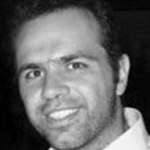

 Dr. George Biskos
Dr. George Biskos George Biskos received his Ph.D. in 2004 from Cambridge University (UK), after which he spent three years as a Research Associate at Harvard University (USA). Currently he is a faculty member at the Cyprus Institute (Cyprus) and at Delft University of Technology (The Netherlands). His research interests span over the broader area of aerosol science and technology, ranging from the development of instrumentation for measuring airborne particles, to atmospheric aerosol chemistry and aerosol based nanotechnology.
Ever growing population in cities is associated with the deterioration of Air Quality (AQ), which in turn can have adverse effects upon human health. Even in big cities, existing AQ monitoring networks consist of a limited number of stations that employ relatively expensive and bulky instruments. To capture the temporal and spatial variability of urban air pollution, however, we urgently need to develop dense networks of compact and inexpensive Environmental Monitors (EMs) capable of measuring the concentration of key EU-regulated gaseous pollutants (e.g., CO, NO2, and SO2) and Particulate Matter (PM). In this talk I will give an overview of the existing systems for measuring the concentration of gaseous pollutants and key properties of atmospheric aerosols, and discuss recent advances in the field for producing portable and cost-effective instruments that will soon make distributed AQ monitoring a reality.